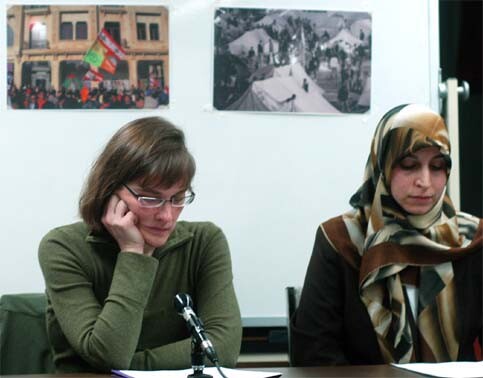The Electronic Intifada 15 December 2006
MONTREAL: Several Montreal-based organizations are speaking out in defence of the popular protests which have overtaken Lebanon’s capital for more than a week. The groups are concerned with a prevailing bias in Canadian media coverage of the events in Lebanon. This bias misrepresents the purposes of the protests and the dynamics that underlie them. It also fuels a dangerous sectarianism that threatens Lebanon.

Mary Foster of Tadamon! Montreal & May Hayder of Al Hidaya Association Speaking at a Montreal Press Conference, Wednesday, December 13th. (Photo: Pedro Ruiz, Photojournaliste Le Devoir)
“Should Lebanon become a client state of the US or does it want a government that represents its citizens and is responsive to the interests of other people in the region? Should the government of Lebanon serve all sectors of its population, regardless of confession and economic status?” asked Mary Foster of Tadamon! Montreal.
“Whatever your opinion of these issues, these are the questions that are motivating people in the tens and hundreds of thousands to stay out on the streets in Beirut. The real political choices that people face in Lebanon, with far-reaching consequences for the entire region, are obscured when the contest is again and again mis-represented in the Canadian media as the sectarian manoeuvering of one party and its regional allies to take over the country,” noted Foster, who returned from a delegation to Lebanon last week.
“In fact, over ten opposition political parties are participating in the peaceful sit-in, bringing together a very significant portion of the population, from all religious and confessional camps, with diverse ideological orientations,” explained Mr. Ziad Najjar of the Council of Lebanese Canadian Organizations (COLCO)-Montreal.
Many of those present at the sit-in come from social groupings who have been historically excluded from economic opportunity, political representation, access to public institutions and services and are among those who have suffered the most from Israel�s attack on the country this summer.
“The symbol of people from the bombed out villages of the south and from the poor suburbs setting up camp in the richest area of the city, with its Gucci and Armani shops, couldn�t be clearer,” added Foster.
The demonstration is a decidedly peaceful and democratic expression of popular will. Far from subverting the democratic process in Lebanon, the non-violent popular expression is working within the country�s political framework to address some of the exclusions and disadvantages that are built into the Lebanese political, economic and social structures. Participants are also expressing their opposition to western interference in their country and hegemony in the region.
“When people came out on the streets to demand that the government stand down after the assassination of former Prime Minister Rafik Hariri, the movement was dubbed the ‘Cedar revolution’ and welcomed in the West as a movement for democracy. Now these peaceful mass protests, which are demanding a more representative government, are being characterized as a coup attempt,” remarked May Hayder of the Al Hidaya Association.
“Could this have something to do with the fact that the protestors are demanding independence from the US this time, and not only Syria? There appears to be a double-standard in the way that the North American media portrays different events and political actors in Lebanon,” noted Hayder.
Tadamon! [Solidarity!, in Arabic] is a Montreal-based collective of social-justice organizers & media activists, working to build relationships of solidarity with grassroots political movements for social and economic justice between Beirut & Montreal.




